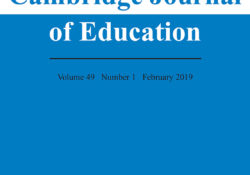tandfonline.com har udgivet en rapport under søgningen „Teacher Education Mathematics“: Abstract Abstract This is the introduction to the special edition on learning analytics. Link til kilde
Like this:
Like Loading...
tandfonline.com har udgivet en rapport under søgningen „Teacher Education Mathematics“: ABSTRACT ABSTRACT With approximately three times the resources per pupil in private compared with state schools, Britain’s private sector presents an interesting case of what could be expected from schools that are extremely well resourced. This paper studies the links between private schooling and educational performance in upper secondary school, as measured through their performance in ‘A level’, the main school-leaving assessment which determines access to universities. Using an English longitudinal study, we find evidence that, compared with otherwise observably similar state school students in upper secondary education and controlling for prior attainment, those at private school study more ‘facilitating’ subjects, which are known to be favoured by high-status universities; they are placed 8 percentage points higher in the A… Continue Reading →
Like this:
Like Loading...
eric.ed.gov har udgivet: This project seeks to answer the question of which intervention practices are most effective for raising the academic attainment of GCSE maths pupils in England. The findings will have the potential to alleviate teacher workload and to raise pupil attainment by refining the intervention schemes employed in schools. The results will therefore also be useful to school policy makers as they plan their investment in interventions as well as teacher educators and their students in noting the importance of addressing pupil needs immediately and reflecting on their practice to assess its efficacy. The research was undertaken in a secondary school in the North West of England, following the progress of 185 pupils in year 11 from the beginning of the year to the end of the course… Continue Reading →
Like this:
Like Loading...
eric.ed.gov har udgivet: The purpose of this study was to empirically test the posit that students who participated in a contextualized, mathematics-enhanced high school agricultural power and technology (APT) curriculum and aligned instructional approach would not differ significantly (p less than 0.05) in their technical competence from students who participated in the traditional APT curriculum and instruction. This study included teachers and students from 32 high schools in Oklahoma (16 experimental classrooms; 16 control classrooms). Students were enrolled in an APT course during the 2004-2005 school year. The experimental design used was a posttest only control group; unit of analysis was the classroom. One-way analysis of variance (ANOVA) was used to test the study’s null hypothesis. The measure of students‘ technical competence did not reveal results that held statistical significance… Continue Reading →
Like this:
Like Loading...
tandfonline.com har udgivet en rapport under søgningen „Teacher Education Mathematics“: Abstract Abstract ‘Ability’ or attainment grouping can introduce an additional label that influences teachers’ expectations of students in specific attainment groups. This paper is based on a survey of 597 teachers across 82 schools and 34 teacher interviews in 10 schools undertaken as part of a large-scale mixed-methods study in England. The paper focuses on English and mathematics teachers’ expectations of secondary school students in lower attainment groups, and explores how low-attaining students are constructed as learners who benefit from specific approaches to learning justified through discourses of nurturing and protection. The authors argue that the adoption of different pedagogical approaches for groups of low-attaining learners to nurture them may in some cases be fostering dependency on teachers and cap… Continue Reading →
Like this:
Like Loading...
tandfonline.com har udgivet en rapport under søgningen „Teacher Education Mathematics“: Abstract Abstract There is a substantial international literature around the impact of different types of grouping by attainment on the academic and personal outcomes of students. This literature, however, is sparse in student voices, especially in relation to mixed-attainment practices. Research has indicated that students of different attainment levels might have different experiences and views of grouping structures. This paper represents a significant contribution to this literature. Drawing on the data collected as part of a large study on student grouping and teaching in England, we analyse the attitudes of students of different attainment levels to mixed-attainment practice, focusing on their explanations for their preferences or aversion to mixed-attainment classes. The data-set is drawn from group discussions and individual interviews… Continue Reading →
Like this:
Like Loading...
eric.ed.gov har udgivet: Case study research suggests that NLP [neuro-linguistic programming] influencing strategies benefit teacher effectiveness. Maths pedagogy involving higher-order questioning, challenge, problem solving and collaborative working may be a way of improving attainment in adult numeracy learning, however, such strategies may be less effective if the relationship between teacher and learner does not reflect sensitivity to attitudes, beliefs and emotions (areas in which advocates of NLP claim effectiveness). The present study investigated these claims and the combined effect of such approaches using a pre- and post-treatment test design with 173 adult numeracy learners. Teachers were randomly allocated to three conditions, these were: (1) teachers given no training (control condition); (2) teachers trained in innovative maths pedagogy (including more frequent higher-order questioning, challenge, problem solving and collaborative learning); and (3)… Continue Reading →
Like this:
Like Loading...



